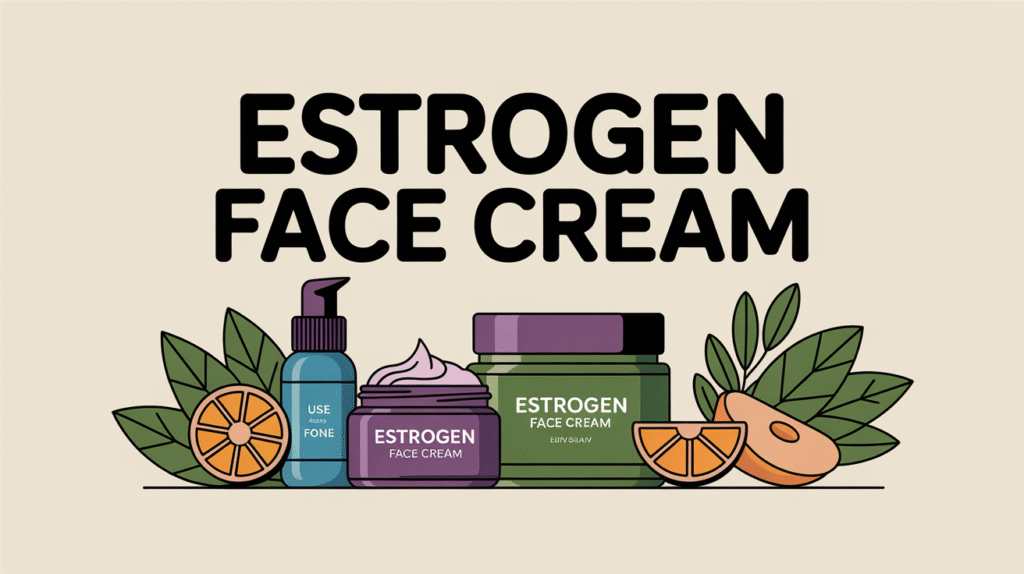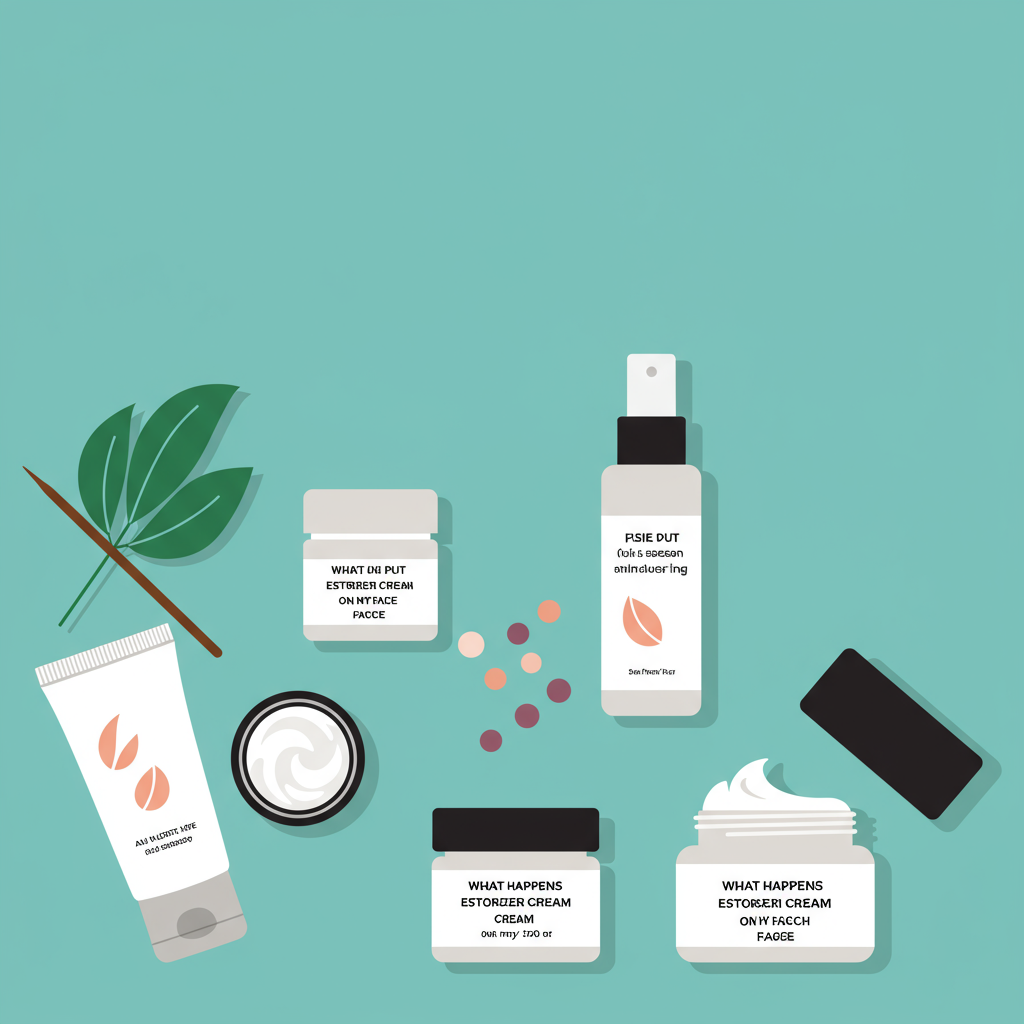This article provides general information and is not a substitute for professional medical advice, diagnosis, or treatment. Always seek the advice of your physician or other qualified health provider with any questions you may have regarding a medical condition.The quest for youthful, radiant skin is a journey many embark on, often exploring a myriad of creams, serums, and treatments. In this pursuit, a question occasionally arises, often stemming from curiosity or misinformation: what happens if I put estrogen cream on my face? While estrogen plays a vital role in skin health, influencing collagen production, elasticity, and hydration, applying a prescription-strength hormonal cream designed for specific medical conditions to your face without medical guidance is a serious concern. This blog post aims to shed light on the potential outcomes, risks, and why such an application is generally ill-advised.
Many women, especially those approaching or experiencing menopause, notice changes in their skin quality, leading them to wonder about hormonal interventions. Estrogen cream is a powerful medication, typically prescribed for conditions like vaginal atrophy. Its formulation, concentration, and intended absorption are all designed for very specific uses. Applying it off-label to your face could lead to unintended systemic effects, localized skin reactions, and hormonal imbalances, none of which are beneficial for your skin or overall health. We’ll dive deep into the science, the risks, and the appropriate ways to support your skin’s health.

Understanding Estrogen Cream and Its Intended Use
Before exploring what happens if I put estrogen cream on my face, it’s crucial to understand what estrogen cream is and how it’s designed to be used. Estrogen creams are a form of hormone replacement therapy (HRT) specifically formulated for topical application. They contain estrogen, a primary female sex hormone, which plays a significant role in various bodily functions, including maintaining the health of skin, bones, and reproductive tissues.
What is Estrogen Cream?
- Hormonal Medication: Estrogen cream is a prescription medication containing synthetic or bioidentical estrogen.
- Targeted Delivery: It’s formulated for local application, typically to the vaginal area, to address symptoms of menopause such as vaginal dryness, itching, and painful intercourse (vaginal atrophy).
- Low-Dose Systemic Absorption: While primarily local, some estrogen from the cream can be absorbed into the bloodstream, leading to a minor systemic effect. The amount absorbed depends on the concentration, application area, and individual factors.
Why Is It Prescribed?
Estrogen creams are generally prescribed by healthcare professionals for specific medical conditions. Their primary use is to alleviate symptoms associated with a decline in estrogen levels, particularly during menopause. These conditions include:
- Vaginal Atrophy: Thinning, drying, and inflammation of the vaginal walls due to a drop in estrogen.
- Dyspareunia: Painful intercourse caused by vaginal dryness and atrophy.
- Urinary Symptoms: Some menopausal women experience urinary urgency or recurrent urinary tract infections due to estrogen deficiency affecting the urinary tract.
The cream directly delivers estrogen to the affected tissues, helping to restore moisture, elasticity, and overall health to the area.
The Realities: What Happens If I Put Estrogen Cream On My Face?
The idea of using estrogen cream on the face might stem from the knowledge that estrogen is beneficial for skin health, contributing to collagen and elastin production, which are key for youthful skin. However, applying a prescription-strength hormonal cream to your face is not the same as using a cosmetic product and carries significant risks. So, what happens if I put estrogen cream on my face without medical guidance?
Potential Risks and Side Effects
The skin on your face is delicate and highly absorbent. Applying estrogen cream here can lead to a range of undesirable outcomes:
- Systemic Absorption and Hormonal Imbalance: While designed for local action, applying estrogen cream to a larger, more permeable area like the face can lead to a greater amount of estrogen being absorbed into your bloodstream. This can disrupt your body’s natural hormonal balance, potentially causing:
- Breast tenderness or swelling
- Nausea
- Headaches
- Mood swings
- Unintended effects on other hormone-sensitive tissues
For individuals who are pre-menopausal, this could interfere with their natural menstrual cycle.
- Localized Skin Reactions: The cream’s formulation might not be suitable for facial skin, leading to:
- Irritation, redness, or burning sensation
- Allergic reactions or contact dermatitis
- Acne breakouts or exacerbation of existing skin conditions
- Increased hair growth (hirsutism) in the area of application, as estrogen can sometimes stimulate hair follicles.
- Pigmentation Changes: Hormonal fluctuations or direct application of hormones can sometimes trigger or worsen hyperpigmentation, such as melasma (dark patches on the skin).
- Lack of Targeted Benefit: The cream is not designed to penetrate facial skin in a way that effectively addresses anti-aging concerns. Its formulation is optimized for mucosal tissues, not the epidermis and dermis of the face for cosmetic purposes.
- Drug Interactions: If you are on other medications, particularly hormonal treatments or skin medications, applying estrogen cream to your face could lead to unforeseen drug interactions.
- Cancer Risk Concerns: While low-dose topical estrogen for vaginal use is generally considered safe, any off-label use, especially on larger surface areas or for prolonged periods, raises concerns about potential increased risks for certain cancers (e.g., breast, uterine), particularly if systemic absorption becomes significant. This is a complex area best discussed with an oncologist or endocrinologist.
Why You Should Avoid Self-Prescribing
Using prescription medication like estrogen cream without medical supervision is never recommended. Your doctor considers your overall health, medical history, and specific needs before prescribing any hormone therapy. They monitor you for side effects and adjust dosages as necessary. Self-application bypasses these crucial safety measures.
Safer and More Effective Alternatives for Facial Skin Health
Instead of wondering what happens if I put estrogen cream on my face, focus on evidence-based approaches to maintain and improve your facial skin health. There are numerous safe and effective products and practices specifically designed for facial skin concerns, including those related to aging and hormonal changes.
Topical Skincare Ingredients
For anti-aging, hydration, and overall skin health, consider products containing ingredients proven to be beneficial:
- Retinoids (Retinol, Tretinoin): These are gold standard ingredients for anti-aging, promoting cell turnover, stimulating collagen production, and improving skin texture and tone. Prescription-strength retinoids (like tretinoin) are more potent but also require medical supervision.
- Hyaluronic Acid: A powerful humectant that draws moisture into the skin, providing intense hydration and a plumping effect.
- Vitamin C (Ascorbic Acid): A potent antioxidant that protects against environmental damage, brightens skin, and supports collagen synthesis.
- Peptides: Small chains of amino acids that can signal the skin to produce more collagen and elastin, improving firmness and reducing wrinkles.
- Niacinamide (Vitamin B3): Improves skin barrier function, reduces redness, minimizes pore appearance, and offers anti-inflammatory benefits.
- Alpha Hydroxy Acids (AHAs) and Beta Hydroxy Acids (BHAs): Exfoliants that remove dead skin cells, improving texture, tone, and clarity.
- Growth Factors: Can aid in cellular repair and regeneration, supporting skin health.
Lifestyle and Professional Treatments
Beyond topical products, a holistic approach to skin health includes:

- Sun Protection: Daily use of broad-spectrum SPF 30+ is the most critical anti-aging step, preventing collagen breakdown and hyperpigmentation.
- Healthy Diet and Hydration: Nourishing your body from within with a balanced diet rich in antioxidants and staying well-hydrated contributes significantly to skin vitality.
- Adequate Sleep: Allows your skin to repair and regenerate.
- Professional Treatments: Consult a dermatologist for options like chemical peels, laser therapy, microneedling, or injectables (e.g., fillers, Botox) if you’re seeking more intensive anti-aging solutions.
- Hormone Replacement Therapy (HRT): If you are experiencing significant systemic symptoms of menopause that affect your skin and overall well-being, discuss systemic HRT with your doctor. This is a comprehensive treatment, not a targeted facial application.
Recommended Products for General Skin Health
While estrogen cream is a prescription medication not to be used on the face without medical guidance, maintaining a robust general skincare routine is crucial for healthy, resilient skin. These products focus on hydration, protection, and gentle care, complementing any medically approved regimen or standing alone as foundational skincare. Always consult with a dermatologist to determine the best products for your specific skin type and concerns, especially if you have sensitive skin or existing conditions.
CeraVe Hydrating Facial Cleanser
A gentle, non-foaming cleanser that removes impurities without stripping the skin’s natural moisture barrier. Ideal for all skin types, especially dry and sensitive.
La Roche-Posay Toleriane Double Repair Face Moisturizer
Formulated with ceramides and niacinamide to restore the skin barrier and provide long-lasting hydration. Fragrance-free and suitable for sensitive skin.
EltaMD UV Clear Broad-Spectrum SPF 46
A lightweight, oil-free sunscreen that protects against UVA/UVB rays. Contains niacinamide to help calm and protect acne-prone and sensitive skin.
The Ordinary Hyaluronic Acid 2% + B5
An affordable serum to boost skin hydration, helping to plump the skin and reduce the appearance of fine lines by attracting moisture.
FAQ: What Happens If I Put Estrogen Cream On My Face?
Q1: Is it ever safe to put estrogen cream on my face?
No, it is generally not safe or recommended to put estrogen cream on your face without explicit medical direction from a qualified healthcare professional. Estrogen creams are prescription medications formulated for specific medical conditions, typically involving mucosal tissues (like vaginal atrophy). Using them on facial skin can lead to systemic absorption of hormones, local skin irritation, and other adverse effects not intended for cosmetic improvement.
Q2: Can estrogen cream reverse wrinkles or make my skin look younger?
While estrogen plays a role in skin elasticity and collagen production, applying prescription estrogen cream to your face is highly unlikely to reverse wrinkles effectively or safely. The concentration and formulation are not designed for anti-aging on facial skin. Furthermore, the risks of hormonal imbalance and skin irritation far outweigh any speculative benefits. For anti-aging, proven ingredients like retinoids, vitamin C, and hyaluronic acid are much safer and more effective.
Q3: What are the immediate side effects if I accidentally apply estrogen cream to my face?
If you accidentally apply estrogen cream to your face, you might experience immediate localized reactions such as redness, itching, burning, or irritation. Depending on the amount and duration, some individuals might also experience mild systemic effects like headache or nausea due to absorption. It’s best to gently wash the area with mild soap and water and consult your doctor if symptoms persist or worsen.
Q4: Can using estrogen cream on my face cause unwanted hair growth?
Yes, applying estrogen cream to your face can potentially stimulate unwanted hair growth (hirsutism) in the applied area. Hormones, including estrogens, can influence hair follicle activity. This is one of the reasons why using hormonal creams off-label on sensitive facial skin is not advised.
Q5: Are there any cosmetic products that contain estrogen or phytoestrogens for facial use?
Some cosmetic products market themselves as containing phytoestrogens (plant-derived compounds that mimic estrogen) or other “hormone-like” ingredients. These are typically much weaker than prescription estrogen and are formulated for cosmetic purposes. However, their efficacy for significant anti-aging is often debated, and consumers should be cautious. Prescription estrogen, however, is a different category entirely and should not be confused with over-the-counter cosmetic ingredients.
Q6: What should I do if I’m concerned about aging skin and think estrogen might help?
If you’re concerned about aging skin, especially if you suspect hormonal changes are a factor, the best course of action is to consult a dermatologist or your primary care physician. They can assess your skin, discuss your overall health, and recommend appropriate, safe, and effective treatments. This might include topical retinoids, antioxidants, professional skincare treatments, or a discussion about systemic hormone replacement therapy if medically indicated for broader health reasons.
Conclusion: Prioritizing Safety and Expert Advice
The question “what happens if I put estrogen cream on my face?” ultimately leads to a clear and resounding answer: it’s not recommended and carries significant risks without medical supervision. Estrogen cream is a potent prescription medication designed for specific therapeutic uses, not general cosmetic application on the face. While estrogen plays a crucial role in maintaining youthful skin, the risks of hormonal imbalance, localized side effects, and potential adverse health outcomes from off-label facial use far outweigh any theoretical benefits.
For those seeking to improve facial skin health, address signs of aging, or combat dryness, there is a wealth of safe, effective, and scientifically-backed skincare ingredients and professional treatments available. Your best approach is always to consult with a dermatologist or healthcare provider. They can provide personalized advice, diagnose any underlying issues, and guide you toward appropriate solutions that are both effective for your skin concerns and safe for your overall health. Prioritize your well-being and rely on expert guidance when it comes to any form of hormone therapy or potent medication application.

2 thoughts on “what happens if i put estrogen cream on my face”